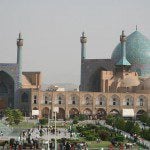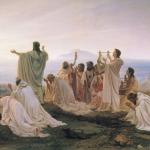
Photo by Frans-Banja Mulder (Wikimedia Commons)
Today’s reading, Alma 23, reports briefly on the consequences of one of the most successful missionary efforts in history.
Notice in 23:14 that the Amulonites and the Amalekites are the only holdouts. They were “dissenters” from the Nephites, and, as I mentioned yesterday, apostates are very commonly the most embittered and hostile enemies of the Gospel.
This chapter also records the rise of the remarkable group known as the Anti-Nephi-Lehies, so curiously like the non-violent resisters that we’ve come to know in the wake of Mahatma Gandhi and his principles of satyagraha and ahimsa — most notably, for Americans, in the best examples from the civil rights movement led by Dr. Martin Luther King.
The term Anti-Nephi-Lehi has always struck me. In Joseph Smith’s culture and linguistic area, the prefix anti- would have connoted opposition (as in the anti-Federalists and the Anti-Masonic Party). Since that would be a strange way to describe people who were abandoning their opposition to the tradition represented by Lehi and Nephi, I’ve wondered whether Anti-Nephi-Lehi might be a small but significant pointer to a non-English origin for the Book of Mormon.
As an Arabist, I’ve idly thought — but haven’t researched it at all — that anti- here might perhaps be related to the Arabic عند (‘inda or ‘anda), which means at or near or even (rather like the French chez) with:
‘andi kitaab jadiid = “I have a new book” (lit. “with me book new”).
Just thinking aloud.












